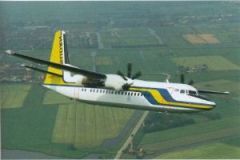Sudanese aviation set to take wing as peace deal signed
By Catherine Riungu, The East African
NAIROBI, May 02, 2005 — Following the recent peace pact that ended Sudan’s 21-year civil war, the country’s aviation industry has become the focus of investors and the government, which wants to see it regain its leading position as Africa’s busiest aviation network in the next three years.
 According to the African Airlines Association (Afraa), the post-war strategy of Sudan’s Ministry of Civil Aviation is to upgrade the civil aviation network that comprises 63 paved and unpaved airports and airstrips. “Twelve of these are paved runways ranging from 1,524 to 3,047 metres in length while the remaining are unpaved,” Afraa says in a report on Sudan.
According to the African Airlines Association (Afraa), the post-war strategy of Sudan’s Ministry of Civil Aviation is to upgrade the civil aviation network that comprises 63 paved and unpaved airports and airstrips. “Twelve of these are paved runways ranging from 1,524 to 3,047 metres in length while the remaining are unpaved,” Afraa says in a report on Sudan.
Priorities involve upgrading of communication, metrological and safety information systems in addition to construction, expansion and development of the country’s domestic and international airports to cope with the envisaged upsurge of traffic.
A number of airlines among them British Airways, East African Safari Air and KLM have already made plans to start flying to Rumbek, the capital of southern Sudan. China and Malaysia have invested a billion dollars each in this sector, which is expected to not only expand it, but bring in skilled labour into the country.
The Civil Aviation Authority, which was given autonomy in reforms that were mooted in 1999 when the Sudan Air Act was amended, and strengthened by the Air Navigation Regulations in 2000, is under increasing pressure to speed up earmarked activities to equip the sector with the facilities to handle increased passenger and cargo volumes. The government projects a 10 per cent annual growth in air traffic over the next three years.
One of the most ambitious plans is the construction of a new airport for the capital – Khartoum International Airport (KIA) – which will cater for about 3 million passengers. Private investors are being sought for the project, whose payback period is estimated to be 15 to 20 years. Cost details are being worked out.
Afraa says that the need to rejuvenate Sudan’s aviation industry stems from three major factors; discovery of oil, the end of war and the World Bank and IMF-imposed economic conditionalities, which are yielding results. “The country is beginning a new life with the government resuming diplomatic relations with several countries and the national carrier, Sudan Airways, expanding its network to other parts of Africa and Europe,” the association says. One of the most notable developments was the resumption of flights to the UK in March after a suspension lasting over 10 years.
Other factors being cited to the envisaged explosion of the aviation industry are export of agricultural and other products and the importation of goods needed for local industries and consumption.
Liberalisation of the economy, particularly in the financial and services sectors and the amendment of the country’s legislation to support private sector investments are expected to catalyse investment. There are currently moves to amend tax laws with the nine neighbouring African countries bordering Sudan.
This will increase trade and movement of goods and services across borders and be a boon to the aviation industry.
The oil drilling industry, a major economic activity, usually rotates crew frequently between places of work and home base. This has seen many charter operations flying into and out of Sudan. These workers travel with their families and visit home during holidays, thus creating considerable air traffic opportunities.
The country’s tourism potential and the activities of humanitarian non-governmental organisations are also expected to boost air travel.
